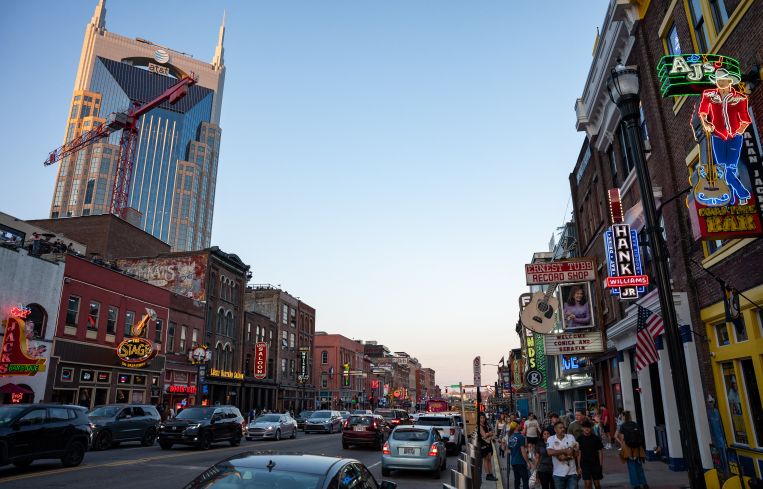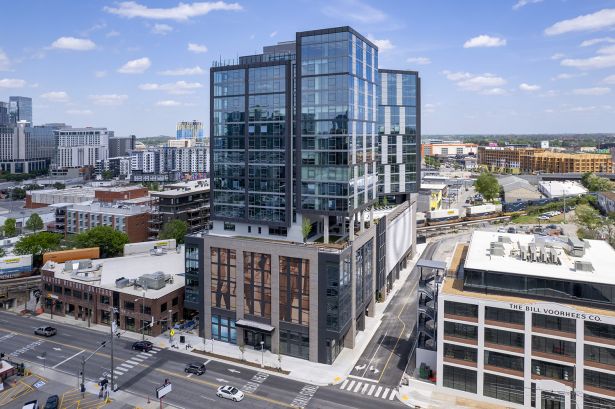Nashville’s Multifamily Market Becomes a Sure Investment Bet
The gulf between supply and demand in the fast-growing metropolis is closing fast, making developers more confident
By Larry Getlen June 17, 2024 6:00 am
reprints
Nashville the past few years has enjoyed a boom in multifamily construction at a time when new residents and new jobs seemed to be entering the Tennessee city’s market in numbers usually reserved for peak season at Dollywood-dominated Pigeon Forge three and a half hours to the east.
But reality never lines up exactly as it should, and the word “oversupply” has been on everyone’s lips of late regarding Nashville multifamily.
The number of units under construction in Nashville compared to its existing inventory was fifth highest out of the country’s 50 largest markets. And to give an idea of the full level of Nashville’s construction boom overall, the city’s Chamber of Commerce has noted that 68 percent of the Nashville skyline has been built since 2014 — the highest percentage in the U.S. during that 10-year period.
As a result, supply has overtaken demand by a large margin.
In the second quarter of 2023, Matthews Real Estate Investment Services released a report citing a 10.8 percent vacancy rate for the city’s multifamily stock — the highest in 20 years — with 22,000 units under construction. At the time, the report said, “approximately one out of every three residential communities in the area was providing some form of concession to attract tenants.” Only two years prior, that concession figure had been only one out of 20.
By December 2023, brokerage Colliers noted that the average concession in Nashville had risen to 8.8 percent of average asking rent, which itself still stood below Nashville’s five-year average.
While the supply/demand ratio may be less than perfect, many believe a correction is currently underway, as construction starts have slowed in 2024. According to CoStar, Nashville’s multifamily construction pipeline was down to 20,000 units at the end of this year’s first quarter, a 27 percent drop from the end of 2022.
The city and surrounding area’s population, meanwhile, has increased by 81,000 since 2020, a 4 percent increase that has made Nashville the eighth-fastest-growing metropolitan area in the country, putting it on par with Phoenix. This growth included more than 37,000 residents moving into the Nashville region in 2022 alone and over 31,000 new residents in 2023, a pace that is continuing this year.
“Nashville has really turned into a top city for people to move to from around the country,” said Rajen Shastri, founder and CEO of Akara Partners and the developer of Kenect Nashville, a 20-story co-living building featuring 420 residential units, 21,000 square feet of retail and 20,000 square feet of coworking space. “There’s a tremendous migration pattern from larger cities, or other cities in the Southeast, to Nashville. We see it in our building in people from the East Coast, from New York, and from the West Coast, with a lot of folks from L.A. and San Francisco.”
And, while housing supply finally edges downward and the city’s population rises, job figures also contribute to reasons for long-term optimism around leasing up new apartments.
Tech giant Oracle is bringing 8,500 jobs and around $1 billion in investment to its new 1.2 million-square-foot world headquarters in Nashville. Amazon also promised to add at least 5,000 jobs here several years back, although a string of layoffs in 2022 have called those numbers into question.
Colliers cites the federal Bureau of Labor Statistics in noting that “job growth in Nashville was 2.1 percent in November 2023, reflecting 24,400 jobs added during a 12-month period,” which was above the national average of 1.8 percent. Looking ahead, the brokerage cites property management software firm RealPage in forecasting job growth of 0.7 percent for 2024, and an annual average of 0.8 percent from 2025 to 2027.
To add to an overall optimism around Nashville’s future, the investor class seems to agree that Nashville is a city on the rise, and multifamily is the place to be, investment-wise.
“Multifamily investment has definitely dominated over the other sectors,” said Katie Lester, a research director for Colliers. “In 2021 and 2022, which were two banner years for national investment, multifamily made up the majority of those sales in Nashville, including over $6 billion in sales for 2022. So multifamily really dominated the investment side.”
Specifically, in 2021, Nashville saw $8.7 billion in total investment volume, with $5.3 billion of that going into multifamily. In 2022, those numbers rose to $10.6 billion total and $6.1 billion in multifamily. During the down year of 2023, the investment figures were $3.6 billion total, with $1.8 billion headed toward multifamily.
But, while 2023 saw a significant drop, Lester said 2024 is showing clear signs of a revival.
“In talking with a lot of investors we work with and developers throughout Nashville, even though volume was quite a bit lower for 2023, the sentiment was if you don’t have to sell, then don’t. Just hold onto it and wait. That was a big [reason for] the low volume,” said Lester. “But what we’ve seen so far in 2024 is that buildings have come on the market and sold that wouldn’t have done so in 2023. So we’re headed in a better direction now.”
In the midst of a sea of empty apartments, there are other signs as well that change for the better — even if incremental at the moment — is on the way.
Earlier this month, CoStar announced that apartment demand in Nashville was showing clear signs of a rebound since an early 2023 nadir (which itself had matched an early 2020 nadir, during the start of the pandemic).

“At the end of May, trailing four-quarter net absorption, or the change in the number of occupied units, was 9,300 units, up 184 percent from the low during the first quarter of 2023,” according to a CoStar report. “As consumer sentiment increased and inflation cooled, renter demand rose nearly 131 percent from the prior year in the first quarter.”
Blaise Tomazic, market analytics director at CoStar, notes that the appearance of a slowly stabilizing economy will help increase absorption after several years of greater uncertainty.
“It’s certainly been improving since the calendar turned to 2024,” said Tomazic. “As the economy continues its trajectory of maintaining a steady course, you’ve seen renter demand tick back up.”
Tomazic noted that given Nashville’s supply boom, the disparity between supply and demand is closing at a rate that foretells a healthy market.
“Since 2020, the market’s had the second-largest inventory expansion across the country,” he said. “According to our data, it’s about 28 percent, which is second only to Austin, which is about 28.5 percent
“In our current forecast — we change these quarterly — we’re starting to show things balancing out into the back half of 2024 or into 2025, where supply is still outpacing demand a little bit, but not as drastically as it has the last couple of years.”
Given all this, developers taking the long view understandably see tremendous potential in the fast-growing market.
The developer SomeraRoad just unveiled Prima at Paseo South Gulch, a 16-story, 278-unit mixed-use tower which, in time, will be part of a six-building complex that will include more multifamily as well as condos, Class A office, a luxury hotel and retail. The Prima building opened this spring with one-bedrooms starting at $2,300 a month, 18,000 square feet of that Class A office, and 8,000 square feet of the retail.
Ian Ross, SomeraRoad’s founder and managing partner, said that his company owns around $3 billion in real estate across the country and invests in over 50 markets.
There is no city he’s more bullish on than Nashville.
“Far and away, I still believe — and the data and ULI support this — Nashville is the best market for real estate investing in the country,” said Ross, alluding to how the Urban Land Institute named Nashville the “No. 1 Market To Watch” this year for the third consecutive year.
“If you have a long-term hold perspective and you look out over the next 10 years, there’s no market I would sooner bet on than Nashville,” Ross said. “From a diversity of economy perspective, looking at eds and meds, tourism, population growth, GDP growth, climate, culture, no tax rate — Nashville has the recipe for success. And, Nashville’s in its third or fourth inning, whereas Austin might be in its sixth or seventh inning. Nashville’s still just at the precipice of its growth.”
That said, just as nothing is more relevant in real estate than location, location, location, Ross notes the importance of Paseo South Gulch being located near, but not in, Nashville’s ever popular and populous downtown.

To SomeraRoad, the upscale Gulch neighborhood — which even uses the tagline “between Nashville’s Music Row and Downtown,” emphasizing its proximity to Nashville’s greatest attractions while making clear it’s not actually amid their crowds — offers the perfect blend of leisure, excitement and homey seclusion.
“Downtown has been overrun. The most desirable area in Nashville multifamily is the Gulch,” said Ross. “If you look at Nashville tourism, we hit a peak last year at $10.7 billion of GDP contribution. Nashville tourism is on fire. But what that does is create a pretty chaotic downtown around Broadway, and, from a living perspective, it’s a less desirable place to be 24/7, 365 days a year. So, for a lot of your luxury multifamily product, which is what most people were building, that experience is much better in the Gulch. It’s become like the second downtown, but the one that’s away from the honky-tonk tourism.”
The Gulch is also home to 1200 Broadway, a 26-story, mixed-use tower from Endeavor Real Estate Group featuring over 66,000 square feet of Class A office, 313 luxury apartments and a Whole Foods Market. The property’s marketing materials emphasize the surrounding community’s walkability.
Of course, some people appreciate being in the heart of the action, and at least one major development is reflecting that in a big way.
Nashville Yards could be considered a micro-neighborhood, and comparisons to New York City’s Hudson Yards — which the developers visited while planning this community — would not be wide of the mark. A 19-acre master-planned community from Southwest Value Partners, Nashville Yards will eventually include two luxury hotel properties, a 4,500-capacity music venue called The Pinnacle operated by AEG, a dine-in cinema, over 3 million square feet of Class A office space, 7 acres of open space, retail and restaurants, and more than 2,000 residential units.
The project’s initial multifamily component consists of two towers, The Everett and The Emory, developed in conjunction with StreetLights Residential. The buildings are 34 and 35 stories, respectively, and come with a raft of amenities: a pool, a fitness center, coworking space and a golf simulator. More than 650 apartments will begin leasing this summer, with move-ins expected in November. Southwest expects to add five more residential towers to Nashville Yards.
Joe Bucher, managing director and partner for design, visioning and development strategy at Southwest Value Partners, believes that the all-encompassing nature of Nashville Yards, combined with its downtown location, will help them avoid some of the pitfalls of the current high-vacancy environment.
“It’s about the overall offering,” said Bucher. “We’re not just developing a multifamily building, just like we’re not just developing an office building, or retail. Nashville Yards itself is an offering. It’s the biggest development in the city. It’s living in a big planned development downtown in a really dynamic way, where you have all the things at your front door. It’s a pretty compelling amenity package for anybody that’s going to jump into living in the heart of the city.”
Bucher also believes that the project’s timing is spot on, as Nashville Yards is beginning to lease its multifamily component just as the city’s supply/demand divide is expected to narrow.
“Nashville Yards is delivering at a time when there’s not as much supply, and when you’re starting to see those numbers start to reverse themselves,” said Bucher. “I feel really good about our timing.”
Even if the project begins leasing while the supply/demand equation has yet to even out, Bucher is confident that the uniqueness and comprehensive nature of Nashville Yards’ offerings will burnish the company’s leasing strategy.
“We’re not pretending to be immune from market factors,” said Bucher. “What we’re really trying to do is differentiate ourselves in a way that we just don’t play in quite the same box.”
Consensus seems to be that once the oversupply problem wears down over the next 12 to 18 months, Nashville’s many advantages will come to bear, leaving the city as one of the most prosperous and evolving nationally in the years ahead.
“Every time I go to Nashville, I am more and more enthusiastic about what I see,” said Akara Partners’ Shastri. “Nashville is truly a city that can compete with any larger metro area. It’s a great place to recruit and a great place to do business. I continue to be bullish on the Nashville market as a whole.”



